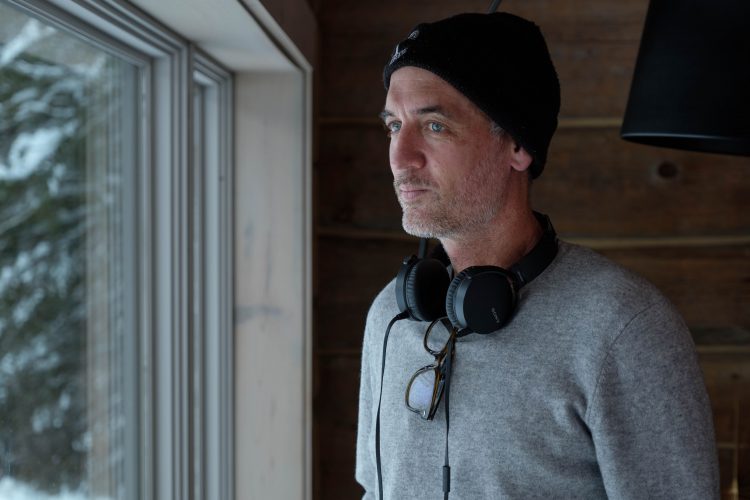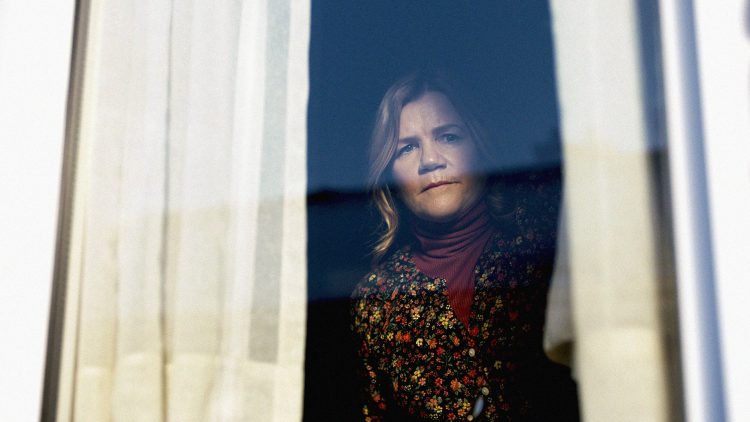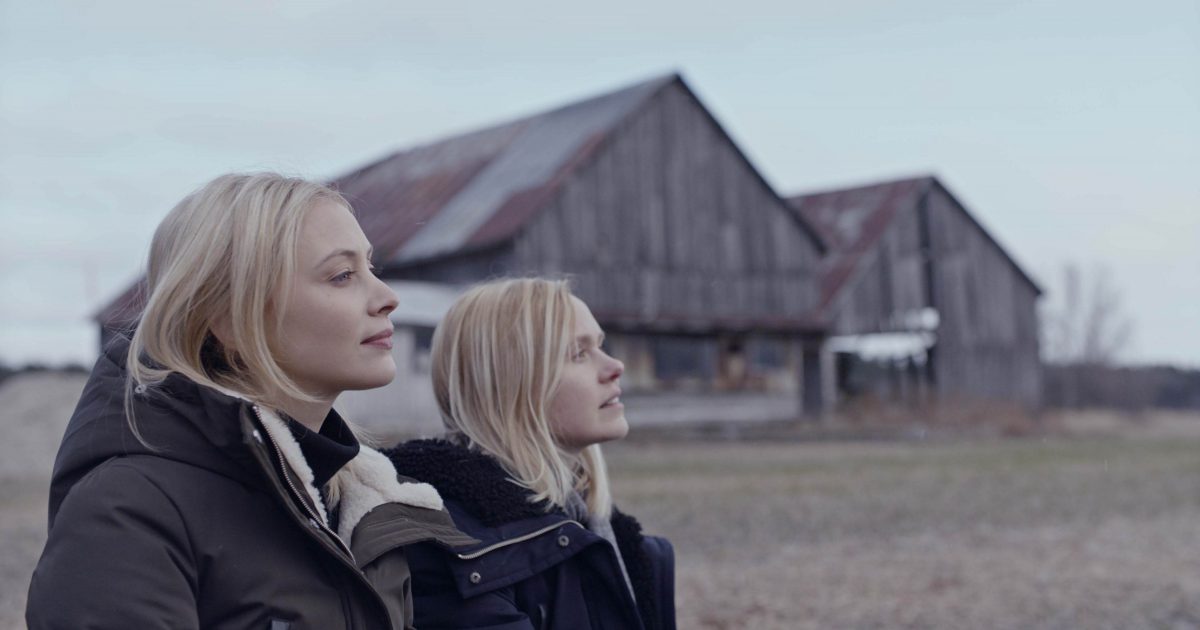![]() Canadian author Miriam Toews drew heavily from personal family tragedies for her 2014 novel “All My Puny Sorrows”. The novel explores the tumultuous relationship between two sisters – Yoli, a soon-to-be-divorced, struggling novelist; and, Elf, a happily married, successful pianist. Elf is suicidal, and Yoli is struggling to help her to hold on to life.
Canadian author Miriam Toews drew heavily from personal family tragedies for her 2014 novel “All My Puny Sorrows”. The novel explores the tumultuous relationship between two sisters – Yoli, a soon-to-be-divorced, struggling novelist; and, Elf, a happily married, successful pianist. Elf is suicidal, and Yoli is struggling to help her to hold on to life.
Canadian filmmaker Michael McGowan has written, directed and produced an adaptation of the novel that is enjoying a festival-run in 2021. The film is an empathetic adaptation that positions the tumultuous relationship of the sisters (played excellently by Alison Pill as Yoli and Sarah Gadon as Elf) against the quieter grief of their mother (Mare Winningham doing superb work on the edges as the mother keeping it all together).
In many ways, this kind of domestic drama is familiar but it’s a welcome reminder of the kind of independent and people-focused cinema that tends to get lost amidst more bombastic approaches to contemporary cinema. I sat down with Michael, Mare and Alison after the film’s world-premiere in September at the Toronto International Film Festival to talk through their approaches to making the film and their relationship with the material.

This interview has been edited and condensed for length and clarity.
Andrew Kendall (AK): I just finished watching the movie over the last weekend, and one surprising thing was that despite being about such heavy topics, there are so many unexpectedly humorous moments throughout. Did you have any worries in navigating that dichotomy in your screenplay and direction, Michael?
Michael McGowan (MM): For me the humour was one of the reasons I wanted to do it. I just thought it was such a beautiful thing that Miriam had done in the book and it helped to not make the film relentless. Despite the places it goes, I felt that there was an uplifting quality. At the end we’re meant to move on, and I thought that was a powerful affirmation. In translating to the screen, first of all, Alison, Mare and Sarah are all great comediennes. But I also knew it couldn’t be a kind of a winking or nodding humour.

The humour had to feel rooted in the humanity of the characters, not about who’s going to do a joke for the sake of doing a joke. So that was a line I was always interested in exploring. It doesn’t matter if the audience laughs, but it just had to feel like this was part of the world that they live in. Last night, watching the film at the premiere, it was interesting watching the audience watching it. I think there were moments where the humour in certain placements gave the audience a chance to breathe, and that allowed other parts to be unexpectedly humorous.
But it was never an intention of ‘they have to laugh here’, but it was instead part of the language of this world that I wanted to explore in the writing. And then watching how great these actors were in those moments.
AK: And what about for you, Alison? Especially as Yoli is moving between so many shifts in humour and seriousness so often. How do you navigate that as an actor?
Alison Pill (AP): For me, I think, life isn’t just sad. It’s just not. It’s the reason why in that funeral scene, for example, where you see the toddler coming up and starting to eat the ashes and it’s odd but that’s also part of this world. And the ability to see that, is the way through and the difference between Yoli, Elf or even Lottie. And navigating those moments is what allows Lottie and Yoli to go on. And in meeting Miriam and talking to her about her mom, and her sister, it was overwhelming to have that time. So, to be able to find those moments and to enjoy those moments with every ounce of your being, to be able to know in your bones that you can make your family laugh. That’s enough to be able to keep you afloat as a performer.
AK: On the topic of drama, though. Mare. You’ve done a number of domestic dramas over the years and there are two in particular that seem to be accidentally in conversation with “All My Puny Sorrows”. There’s your more recent work as a mother mediating two siblings at odds in “Brothers” and then there’s your earlier work in “Georgia” where you were one of two siblings who were at odds. And I’ve love to hear you speak more to this trend in your career, and the way you approach these kinds of films.
Mare Winningham (MW): I always just go from the screenplay, whatever I’m reading. And there are the overlaps you mention here. I think the commonality is that they’re three great screenplays. And I find the familial setting often gives you the most oomph in drama. And certainly in “Georgia”, where I was one of the two sisters – and that’s a 25-year-old movie – there’s quite a parallel between “All My Puny Sorrows” and “Georgia”. In both we find two sisters, one who (for the lack of a better word) is self-destructive, and one is trying to survive that or trying to work around that. So that’s a potent subject. And I’m happy to revisit here in “All My Puny Sorrows” as the mother, because I think I was really struck seeing the movie last night.
It’s one thing to read it on the page, but it’s another thing to see those scenes between the two sisters coming off the screen, and it just got me good. I felt like it was everything worthy of the depth of that subject of one wanting to live, and one wanting out. How do you uncover and allow for both sides of that to come through in dialogue, you know? And I was just really floored by those scenes.
And now that I think back to “Georgia” I think Jennifer Jason Leigh and I had a couple of similar scenes. It was a like a battle of love and hate, really. Because those two things come together in sisterhood.
And with “Brothers”, I think. I came into that at an odd time. It was made during the writer’s strike. And Sam Shepherd and I were the parents of the two brothers, and it was a Danish film that I had seen and was mad for. And then found myself on the set of the American version, and I was admittedly a little lost as to what my place in it was. But, I wasn’t lost in terms of how the two brothers were also navigating that same theme that you point out, of love and hate and the collision between the two in that kind of volatile sibling relationship.
AK: Michael, the film – like the book – oscillates between the timelines and it uses Yoli’s overhead narration to tie some of that together. In adapting the novel, did you have any hesitance about keeping things nonlinear?
MM: In thinking of the film, like the novel, it’s the past and it’s the present and it’s the future but it’s also a continuum and I really wanted to explore the ways that Miriam was writing this story as a tribute to her sister and father. Miriam wrote this beautiful piece of art out of this terrible thing and there are so many fascinating layers to explore. Not in a meta or unemotional way but in the opposite. Really emotional and visceral way out of her lived experience.
AK: Did you have hesitance about using overhead narration? Or, Alison, was that something that made you rethink how you’d approach the role? Because your voiceover kind of ties the timelines together, and I was wondering how you wrestled with that responsibility? Because, you’re acting in the scene as Yoli in the moment, but you’re also writing the novel which is the movie. How did you approach juggling those versions of Yoli?
AP: That’s such a great question, because in reading the screenplay that’s always my fear. You see voiceover and you’re like “uh-oh”. (She laughs and Michael joins in.) You’re like, “Oh f—-.” I think the thing what was grounding about it for me is that final scene of the film tells you, the book is about us. You know? And so, you get more clearance in a way on narration because this is the book. This movie is the book. These scenes are from the book and you’re watching me write that.
So, in the end it’s not so much that Yoli the narrator isn’t herself, it’s almost like everything else is a self-conscious memory. It’s like the entire movie is her looking at her life. And so, it was really helpful to speak to Miriam about it and to think about it. She’s such an incredible human, and so grounded. And her availability and ability to speak of her sister and keep her alive in this way, and to have her kind of immediately there was so moving. In the conversations I had with her, it was like she was so present and that was what I used to approach those voiceover moments. As much as she might come to the novel with some distance and acceptance, it’s also her way of keeping her sister alive.
MM: I remember when Alison was doing the voiceover scenes, she was like “I don’t know if these are gonna work”. But I was like, “Let’s use them as place-holders for now, and we’ll see.”
AP: That’s the thing! We recorded it in a closet. In about 20 minutes. It wasn’t even post. It was while we were shooting. We were like, “hey we’ve got 20 minutes while they rig up the car. Let’s go into this weird closet.” And, I really thought we’d rerecord them all. We only had to rerecord one alt!
MM: And I remember I looked at it on the page, like this could or couldn’t work. And I said that to Alison, “Let’s record and we’ll see. We might end up doing a lot of different things.” And she went, “Okay, let’s do it.” And you did it so well, obviously.
AK: In contrast to the talkativeness from the sisters, Mare, you’re working in such a different register. Lottie is so often silent. And considering how talkative and quippy the rest of the movie is, how did you navigate dealing with that grief without having all the quippy dialogue, or quoting the poems or the books.
MW: I did have to fill in a lot from what I’d read in the book after the screenplay. She’s a very busy woman, and I think Miriam is actually writing a book about her relationship with her mother. It’s such a singular and beautifully humorous relationship. Her mother is an endless source of humour to her and amusement and it’s totally rooted in her love. But then there’s the outrageousness in the turns her mother takes, and I think it was a really good counterpoint for what the sisters are navigating in those scenes. So, I did have to fill it out a bit and some of it is on the cutting room floor. But, this sort of idea of the person who’s always got something going on was fascinating. I think of it being a busy-bee. The gates of hell opened for this woman. She had to walk through them and she went through so much. So, it’s a silence borne out of that busyness.
She’s all the more attuned to the pleasures of life – her mothering, her daughters, the pleasures of a book and of a shower of sitting and playing cards. So those tiny moments are all heightened, not because of the puny sorrows but the big ones she’s come through. So, I filled it out a bit. I hope I filled it out, I’ll always look and go hmmm.
I saw it for the first-time last night and afterwards I was tossing and turning in bed thinking of the ways I could have done more. (Laughs) but that’s the nature of being a performer.
AK: Well, you definitely filled it. You were great.
MW: Thank you! (She laughs.)
After a world-premiere at the Toronto International Film Festival (TIFF), the domestic drama will open the 2021 Cinéfest Sudbury International Film Festival and the 2021 Calgary International Film Festival later this year before a theatrical release. You can read more about my thoughts on the film and other TIFF premieres here.






